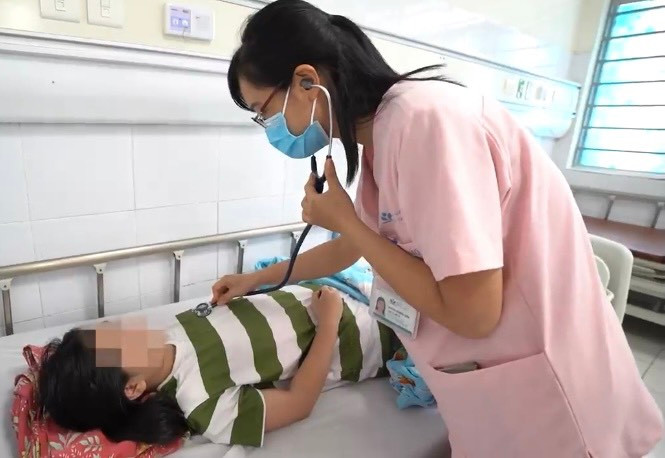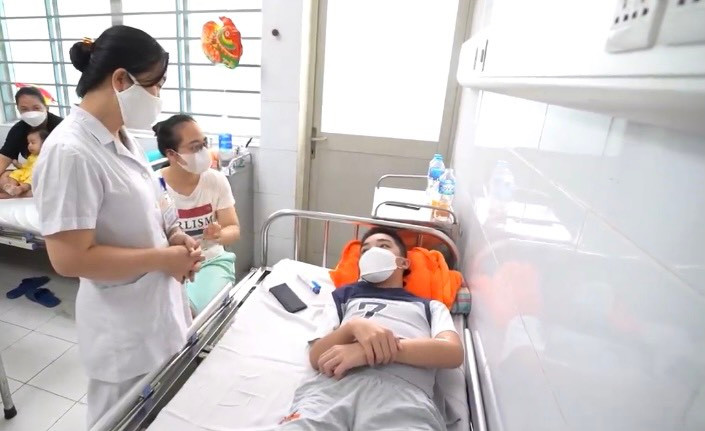At the National Children's Hospital, the number of children with hemorrhagic fevers is increasing rapidly; many children being treated here are in serious condition.

In recent days, the National Children's Hospital has recorded a rapid increase in the number of children suffering from bleeding; many children being treated here are in serious condition.
Being treated at the Department of General Internal Medicine - Tropical Disease Center (National Children's Hospital), patient THH has passed the dangerous stage but is still tired and sleeps lethargically. Before that, the patient suddenly developed a high fever, fatigue, abdominal pain, and nausea, so his family took him to a nearby hospital for examination. The doctor diagnosed that the child's condition had worsened, so he was immediately transferred to the National Children's Hospital for monitoring and treatment.
The patient's mother said: "My child had a fever for about 3 days, then the fever stopped and he started to have a rash. Then he complained of a slight pain in his abdomen, so I took him for an ultrasound and blood test. The doctor said his platelets were low and there was fluid in his abdomen. He was diagnosed with dengue fever. I didn't think the disease would get worse so quickly."
Many children here are also being treated for dengue fever. Usually, children are brought to the hospital when their condition is severe and they have to be hospitalized for treatment.
According to the Tropical Diseases Center, National Children's Hospital, from the beginning of 2023 to now, the Center has received 133 cases of hospitalization due to dengue fever, especially from the beginning of August 2023 to now, there have been 97 children hospitalized, many of whom have severe warning signs. Fortunately, these cases were all treated promptly, so the treatment was effective, the children all recovered well, and there have been no deaths.
Dr. Do Thi Thuy Nga, Deputy Head of the Department of General Internal Medicine - Center for Tropical Diseases (National Children's Hospital) said: "Dengue fever can be detected on the first day of illness when the child has just shown signs of fever without any warning signs, doctors will guide the child to be monitored at home. While monitoring the child at home, parents need to pay attention, the period from the 3rd to the 6th day of illness is the dangerous period of dengue fever, the child needs to be closely monitored".
According to Dr. Do Thi Thuy Nga, when seeing children with dengue fever with symptoms such as: Abdominal pain, nausea, vomiting, not urinating for at least 6-8 hours, especially with symptoms of severe bleeding such as: nosebleeds, bleeding gums, digestive bleeding, it is necessary to urgently take the child to a medical facility for timely treatment to avoid dangerous complications.

Pay attention to the dangerous stage of the disease
According to Dr. Nguyen Van Lam, Director of the Center for Tropical Diseases, National Children's Hospital, children with dengue fever have quite diverse and different signs. The disease often starts quite suddenly and progresses through 3 stages: fever stage, dangerous stage and recovery stage.
In the early stages of the disease, children often have a sudden, continuous high fever. Young children often have the following symptoms: restlessness, crying; older children may complain of headaches, loss of appetite, nausea, skin congestion (possible petechiae under the skin), muscle and joint pain, pain in the eye sockets, bleeding gums or nosebleeds.
After the fever stage, parents need to pay close attention to their children because it is a dangerous stage of the disease. At this stage, the child may still have a fever or it may have subsided, the child may have plasma leakage. If the plasma leakage is severe, it will lead to shock, with easily recognizable symptoms such as: Restlessness, restlessness, lethargy, cold extremities, cold, clammy skin, rapid, weak pulse, little urine, low blood pressure or unmeasurable blood pressure.
In particular, children have subcutaneous bleeding or bruises, scattered or concentrated hemorrhages on the front of both calves and the inside of both arms, abdomen, thighs, ribs; bleeding in the mucous membranes such as nosebleeds, bleeding gums, blood in the urine...
After the dangerous phase of about 48 - 72 hours, there is a recovery phase, the child's fever is gone, the condition improves a lot, the appetite increases, blood pressure is more stable and the urine is more frequent. When the blood test shows that the white blood cell count increases rapidly, the platelet count gradually returns to normal, but usually slower than the white blood cell count.
Dengue fever can easily lead to dangerous complications, so when parents see their child showing one of the following warning signs, they should promptly take their child to a medical facility for monitoring and treatment:
- Children struggle, are lethargic, and have continuous abdominal pain in many areas of the liver.
- Children have nausea and vomiting more than 3 times/hour, or more than 4 times/hour.
- Mucosal bleeding, bleeding gums, rapid decrease in platelets.
- Bleeding gums, nosebleeds, early and prolonged menstruation (for girls)
- Children urinate little and have black stools.
Doctors also recommend that, to avoid complications of dengue fever, when taking care of children at home, parents need to pay attention: If the child has a fever above 38 degrees Celsius, parents can lower the child's temperature by giving the child Paracetamol at a dose of 10 - 15mg/kg of body weight, taken every 4 - 6 hours. In particular, do not give children drugs such as: Analgin, Aspirin, Ibuprofen... Children need to lie in a cool room and loosen their clothes to lower their body temperature.
Parents should give their children plenty of water, fruit juice, and Oresol, many times a day; especially do not give children too much water at once to avoid bloating, which can cause stomachaches. Children need to eat liquid, easily digestible foods; do not give children hard foods or foods high in fiber. In particular, do not give children carbonated, brown, or black drinks to avoid affecting or confusing the diagnosis of the child's illness.
The doctor also instructed that at present, in the North, it is the rainy season, families should pay attention to ensure the hygiene of the area where they live, water containers should be cleaned, emptied, and turned upside down to avoid stagnant rainwater, which can cause mosquitoes to breed and lay eggs. People should sleep under mosquito nets to avoid mosquito bites, and children who are active outdoors should use mosquito repellent sprays to prevent them from being bitten by mosquitoes.